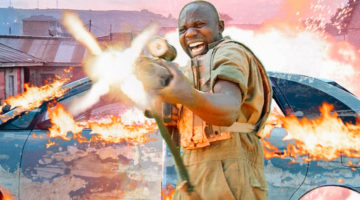Not “Shorts” on Quality: TIFF 2013 Canada Short Cuts
Every year at the Toronto International Film Festival, tucked away on the shelf a wee too far from the Gala Screenings and Special Presentations are a series of short film written, directed, and overall presented by Canadian filmmakers. They typically run between 8-15 minutes, so in that case each second counts and, on that token, every image. The shorts showcase the visions of rising filmmakers, seasoned artists, or ones in a creative transition.
For 2013, a total of 39 short films were selected out of hundreds of submissions. This is the creme-of-the-crop and it comes to no surprise that the 5 shorts in this program that I managed to cover (and interview some of the talent) – Method, We Wanted More, Portrait as a Random Act of Violence, Roland, and Anatomy of Assistance – are nothing short of outstanding. These films come from a Canadian imagination and reflect the nation in versatile ways.
The first two pieces, Method and We Wanted More, are fascinated by the artist’s performance anxiety. Method is the debut short film by Gregory Smith whose stint as an actor in Roland Emmerich’s The Patriot and as a lead on Everwood and Rookie Blue conceived his love for visual compositions and a personal vision that is, in spite of its gritty noir trappings, dearly attached its characters and their insecurities.
In Method, Daniel O’Shea (the “tough yet fragile” Shawn Doyle) tries to force a Juno Awards-worthy confession from a whimpering, spiky-haired Carol (Sarain Boylan) while on set with a group of jaded crew (the studio is actually Mississauga’s own Orbiter Studio). His efforts at first fall short; after, Daniel is on a quest to get in the zone and find the right mentality.
The conflict is only cosmic for an actor: O’Shea can’t get his lines right. “We all have those days”, Smith told me. “As a performer, it’s a delicate thing – your psyche can come down like a house of cards.” Smith channeled this personal anxiety towards capturing a certain truth in Method, which is what he achieves with both comic and dramatic nerve. “It can be a circus”, Smith concludes on acting.
Similarly, recent Ryerson graduate Stephen Dunn’s We Wanted More centres on a performer desperately trying to perfect her craft. His sensibility, however, differs from Smith’s with a heady attention to magic realism and visual motifs. Inspired by Jack Clayton’s 1961 film The Innocents and the works of Guillermo del Toro, We Wanted More takes the artist’s responsibility to surreal and disturbing heights.
It follows a singer (Christine Horne), who is advised by her agent (Angela Asher) to remedy her voice with ginger root. Say what? It gets weird, wait for it. That suggestion takes the film to very bizarre territory, when a young girl (The Captured Bird’s Skyler Wexler) emerges in her apartment’s bathtub, and vanquishes the protagonist’s voice completely, almost Terminator-style. One of the keys to the short’s success is Wexler, who Dunn remarked as so “wise and professional”. Wexler may be a child at heart, but Dunn reassures she has “a precise focus” that is unstoppable to her success as a young actress.
Furthermore, Cory Bowles’ Anatomy of Assistance, which, like We Wanted More, was funded and released by the Canadian Film Centre’s Short Dramatic Film Program is a very mature work about race, education, and class structure. It feels like a Canadian offshoot of Tony Kaye’s American History X with the way it employs a defiant, fiery-eyed young student at odds with the ethics of her school’s principal.
In Anatomy, Talia (Keeya King) is the force of nature, who in the film’s 10 minute run-time has to grow beyond her age to a certain realization about herself and her community. The movie is nearly flawless in its deconstruction of class dynamics and the Domino effect-way crime can escalate from trivial circumstances. Bowles, a Montreal native, describes a black youth’s disaffected existence with a vivid, honest precision. Jeff Morrow’s jazzy score doesn’t sentimentalize the story, but creates a smooth confidence congruent to Talia’s character.
While Anatomy of Assistance may be the Boyz ‘N the Hood of the Short Cuts bundle, another short entitled Roland belongs in the hall of Edgar Wright and the Coen Brothers. Directed by Vancouver filmmaker Trevor Cornish, known for music videos and commercials, makes an effortless turn into short film territory.
Roland dramatizes the awkward quarrel between titular nebbish art department store clerk (Daniel Beirne) and a surly, full-bladdered customer (Shakespearean actor Richard Denison) over the use of the staff’s bathroom. The short is well-paced, darkly funny, and observant. It overcomes its basic conceit by concluding it a mere 5 minutes in. Afterwards, Cornish creates a series of clever confrontations and twists to satisfy the suspenseful last half.
Roland is an example of a Canadian filmmaker taking “a bit of a diversion” from routine to craft a story so concise and well-executed it looks like it’s always been his game.
Last but certainly not least is Randall Okita’s Portrait as a Random Act of Violence, produced by Jason Lapeyre who co-directed the TIFF ’12 hit I Declare War. Where do I begin? It stands out from the other shorts in the sense that it refuses to supply a visible narrative for mainstream tastes. Okita, a festival regular (see his Machine with Wishbone from TIFF ‘08) is interested in expression over explanation. He admires art for its “clunky and crude forms of experience” over navigating cookie-cutter plots.
His intention, in Portrait’s bracing 4 minutes, is to “focus on a feeling, tone, and movement” and dramatize a sculpture crafted from shards of glass (note: the film dazzlingly avoids any use of visual effects). Okita is in the film, but silhouetted and anonymous as what happens to any artist when their work is transferred to the fresh-eyed responses of audiences.
The experimental short comments on the beauty of violence – that it can be responsible for aesthetic merit and not the usual artlessness commonplace with most blood-splattered action movies. Portrait is a movie that seeks, with an emotional simplicity that will allow viewers to engage with its obscurities and “inarticulate moments” that inspire us to wonder if art can really be described on the page… like I’m doing now.
It must be noted: in this article, I’ve only scratched the surface of Canada’s Short Cuts. There are another 34 films to be witnessed, most likely of the same merit. These shorts, while incredibly diverse, share a simplicity that makes them watchable yet engaging for our emotions and intellect.
These films deserve our support and engagement. Below is when Method, We Wanted More, Anatomy of Assistance, Roland, and Portrait as a Random Act of Violence play at this year’s festival. Don’t miss ‘em!
Method, We Wanted More, Portrait as a Random Act of Violence
Monday September 9 @ 10pm
Tuesday September 10 @ 2:45pm
Anatomy of Assistance
Thursday September 12 @ 7pm
Friday September 13 @ 12:15pm
Roland
Wednesday September 11 @ 9:15pm
Thursday September 12 @ 2:30pm
Note: Canada Short Cuts will be shown at the Press & Industry screenings too. Showtimes are available in the Industry section of TIFF.net (username and password is required).





